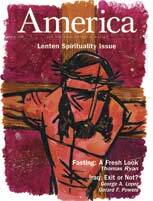I don’t want to be humbled; you don’t either, I suspect. Yet there are people who say it was the best thing that ever happened to them. Members of Alcoholics Anonymous, for example, say that they began to move toward sanity and wholeness only after they had been deeply humbled. Likewise, some elderly people discover happiness and peace when they come to accept being humbled by the aging process. What could that mean? Paul says of Jesus, “He humbled himself and became obedient to the point of death—even death on a cross,” a punishment the Romans used to show who was boss (Phil 2: 8). In Jesus, God “emptied himself.” We tend to think of God as unchanging, untouchable, all-powerful. But let’s take seriously what Paul says about God in Jesus. God, then, is the vulnerable one, the one who does not stand on rights and dignity and honor, but who empties self in order to come close and to engage us. God is that vulnerable, vulnerable enough to die on the cross to win our friendship.
We are created in the image and likeness of God; perhaps, then, to be human means to be vulnerable, to recognize how vulnerable we are. This would mean to accept the reality that we do not have control over our lives in any but a superficial sense. We exist only because God wants us.
It is difficult, however, for us to keep the conviction that everything we are and have is always gift. We want to be invulnerable, and we tend to believe that we are in control, or should be. We glory in our talents, our achievements, our successes. In our hearts we are like the Pharisee who thanked God that he was not like other people, and then went on to list how he differed from them, especially from the publican. Sometimes we come to our senses and realize that all is gift, but it is hard to hold on to that truth.
Perhaps, then, at times we need to be humbled in order to lose our arrogance and shake the belief that we have control over our lives. This, it seems, is what happens when an alcoholic hits bottom. The choices are stark: to continue trying to control one’s life with the bottle and thus spiral down the black hole to oblivion and death, or to admit one’s helplessness and ask God for help. Many alcoholics say that it is only after they have been so humbled that they are able to begin to move toward sanity and life. Only when they had lost everything and turned to God for help did they gradually come to realize that God loves them drunk or sober, a success or a failure, but wants their wholeness, sanity and friendship.
Maybe all of us need practice in being humbled in order to prepare for old age, sickness and death. At that time we may well find we are unable to take care of ourselves and that we need help to eat, to go to the bathroom, to take a shower or bathe. Humbled indeed. In these circumstances, we may find ourselves full of anger and self-pity, railing at fate, at the people who forced us to go to a nursing home and at God. It is not a wholly inappropriate first response; some people, however, never move beyond this stage. They live the rest of their lives seething with resentment and bitterness. Those who come to terms with what has happened, on the other hand, gradually realize how blessed they are to have lived at all and to be alive still; they often experience great happiness and contentment.
Erik Erikson defined the last stage of the life cycle as the struggle between wisdom and despair. Despair involves the refusal or inability to accept who I am now, with all that has gone into making me who I am. Wisdom entails the acceptance of the one life-cycle I have had as the only one possible. To believe that God wants my friendship now, in spite of my sins and failings, is to be truly wise and deeply happy. I believe that those who have been humbled and who come to live with some joy and élan have that kind of wisdom. They can even say of their sins and failures that they were “happy faults.”
Many of us come to this kind of wisdom only when we have been humbled, and we thank God for that grace. But I must admit, I’m still leery.
The 40 days of Lent are a time of invitation. They offer us opportunity to step out of the harried flow of daily life, stop and listen; to hear the cry of our Lord Jesus and let the stony places in our hearts be broken open; to leave old ways behind and undertake anew this passion journey with him.
For the next seven weeks, America offers a series of short spiritual reflections by gifted writers intended to enrich and nourish our experience of the Lenten season. Each essay takes as its starting point a single word that touches on some particular moment or aspect of our Lenten story. We hope they will provide food for prayer as we travel together these holy days.








